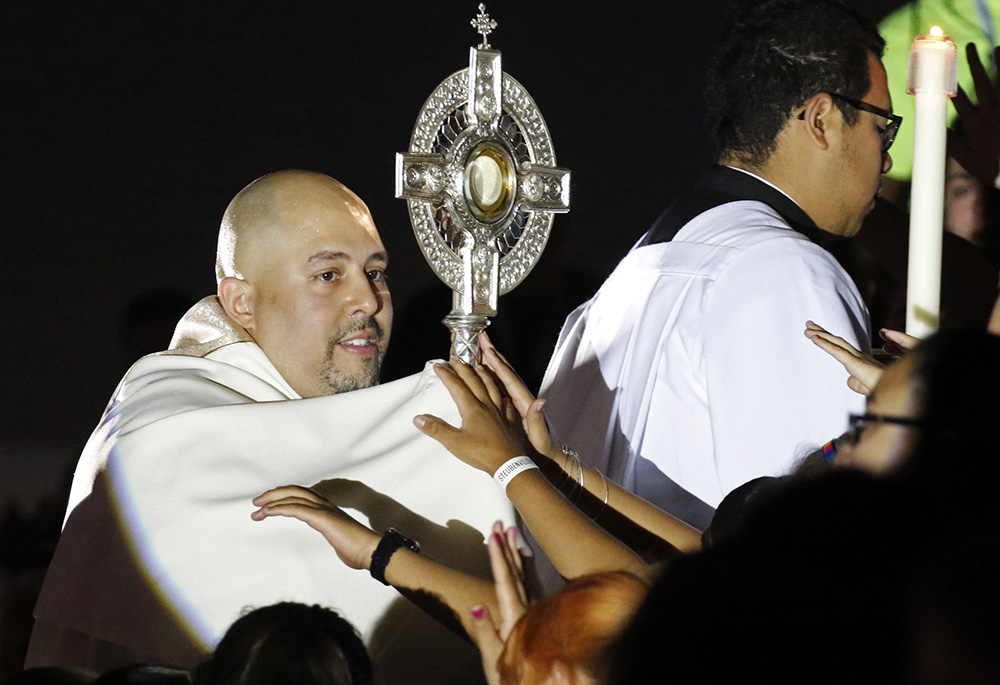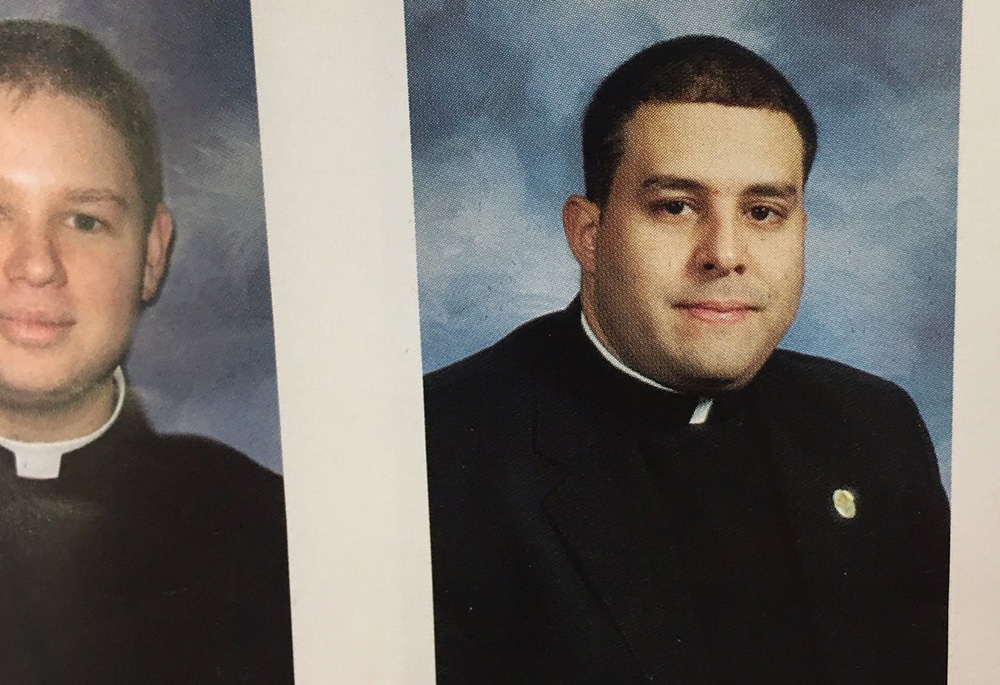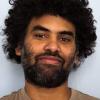
Fr. Joseph Espaillat, spiritual director of the Archdiocese of New York's youth ministry office, carries a monstrance through the bleachers of Carnesecca Arena during eucharistic adoration at the Steubenville New York youth conference at St. John's University June 25, 2016, in Jamaica, New York. Pope Francis appointed him an auxiliary bishop for the New York Archdiocese Jan. 25. (CNS/Gregory A. Shemitz)
For many Dominican Catholics, Auxiliary Bishop Joseph Espaillat's appointment is long overdue but welcome.
The appointment of the first Dominican bishop, at a time when conversations about Afro-Latinidad versus Latinidad are rising in theological spaces, gives us, as U.S. Catholics, the opportunity to more fully uplift and understand the nuances of the Latinx experience.
On March 1, Frs. John Bonnici and Espaillat were to be consecrated as auxiliary bishops by Cardinal Timothy Dolan. Espaillat will be the youngest U.S. bishop.
These appointments by Pope Francis were first announced on Jan. 25. "Pope Francis has selected two outstanding priests, both experienced pastors, to serve the people of God of this archdiocese as auxiliary bishops," said Dolan in following the announcement. "I look forward to working even more closely with Bishop-elect Bonnici and Bishop-elect Espaillat, as they undertake this new role in their priesthood."
Bishop Joseph Espaillat, also known as Father J., was born on Dec. 27, 1976 in Manhattan, and he is the son of immigrants from the Dominican Republic. He is Catholic educated, receiving a Bachelor of Arts in philosophy from Fordham University in 1998.
He was ordained five years later, in May 2003 at St. Joseph's Seminary, Dunwoodie.
From 2009-2012 he worked at St. Peter's in Yonkers, New York, and from 2012-2015, he worked in youth ministry for the Archdiocese of New York.
It is refreshing to see one of our own selected to serve as a bishop for the first time in the Archdiocese of New York. The majority of Catholics in New York City are Latinos, and Dominicans are the largest immigrant group here. Like in many parts of the United States, while Latinos make up the majority of our city's churches and parishes, the church leadership is still predominantly white. Many Dominican Catholics hope that Espaillat could begin to change that, with many hoping he will one day serve as the future archbishop and cardinal of the Archdiocese of New York.

Fr. Joseph Espaillat, a New York archdiocesan priest, is seen in a clergy book from 2009. Pope Francis appointed him an auxiliary bishop for the New York Archdiocese Jan. 25. Bishop-designate Espaillat's episcopal ordination Mass takes place March 1 at St. Patrick's Cathedral. (CNS/Catholic New York/John Woods)
I was a parishioner at Our Lady of Martyrs Church in Washington Heights, upper Manhattan, when Espaillat was beginning his ministry in 2003. I remember I was pleasantly surprised to see him sitting in a neighborhood park, speaking and listening to young people.
He currently serves as a pastor in the South Bronx, at St. Anthony of Padua Church. As part of his ministry, he is a part of "Sainthood in the City," a podcast and YouTube ministry series run by Centro Católico Carismático. He uses rap music to reach out to young people and joked about rapping as a bishop.
While many are praising Espaillat, others point to an episode last year of "Sainthood in the City," in which he described how the devil moves through "azabache" or "mal de ojo," Afro-Indigenous customs popular among many Dominican and Latinx communities. I was not surprised to hear this from him, because many Catholic Dominican bishops also use rhetoric and Scripture to revise how intertwined Christianity and other Indigenous and African worship traditions and faiths are in the Caribbean. This language ignores that God is present in our Afro-Dominican Catholic traditions.
This is an unfortunate part of Dominican Catholicism, yet it is one I hope Espaillat's appointment will help us to begin addressing.
Espaillat has worked as the director of the Hispanic Charismatic Catholic Renewal for the Archdiocese of New York. I grew up in this community because my father, to this day, is a charismatic Catholic. The charismatic Catholic renewal has many times in my life helped me to gather with others in prayer and to express joy through dance and in music in a church setting. I have also met some charismatic Catholics who understand that prayer is a critical part of social justice action, though that is still an issue I think the movement needs to improve on.
Advertisement
In adulthood, while I have grown away from the charismatic faith of my childhood, it is still a part of how I weave my progressive politics into my faith life, including my work as an anti-capitalist Catholic organizer, one who believes in the abolition of all oppressive systems. And because of this lens, while I see and must name how Espaillat's appointment also uplifts the very anti-Blackness I am working to dismantle within Dominican and non-Dominican church spaces, I also find hope in how his appointment and ministry can help challenge our faith, including his charismatic commitment to using resources like rap music to engage with young people.
His appointment arrives at a critical time for the U.S. church, as the number of Latinos continues growing in the United States, and in the church, and as we undergo a synodal process in which Pope Francis invites us into "journeying together and reflecting together on the journey that has been made."
The appointment of the first Dominican bishop, at a time when conversations about Afro-Latinidad versus Latinidad are rising in theological spaces, gives us, as U.S. Catholics, the opportunity to more fully uplift and understand the nuances of the Latinx experience, beginning with addressing just how deep anti-Blackness is rooted in our spaces and communities. I hope Bishop Espaillat can challenge our Latinx and Dominican community to challenge the anti-Blackness within our own communities more deeply, especially as we see the Haitian immigration crisis at the U.S. border and as the Dominican Republic builds a border wall.
I hope his appointment can be prophetic, even if our approaches to our faith differ. I hope that through his work as bishop, he can challenge white Catholics to think more deeply about the white supremacy in our church.
As Catholics, I also hope we can challenge Bishop Espaillat, and the rest of our church leadership, to grapple with their own internalized anti-Blackness. As part of our synodal journey, we must challenge ourselves, our communities, our church and our leaders.
I am grateful to see Dominican representation in the conference, and I pray to Our Lady of Altagracia, spiritual Mother of Catholics of the Dominican Republic, that Bishop Espaillat can be a prophetic voice, like Archbishop Óscar Romero, for all oppressed peoples in the Bronx, in NYC, the U.S., in the Dominican Republic and worldwide.




